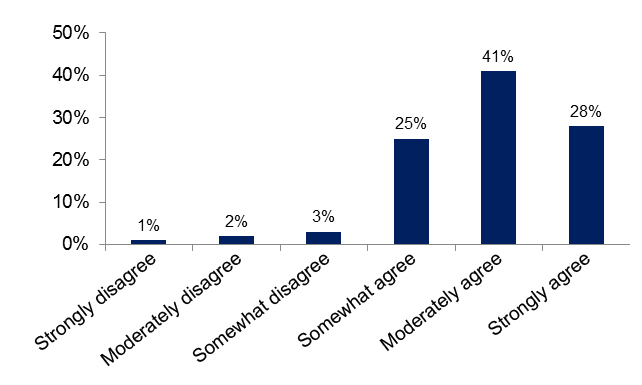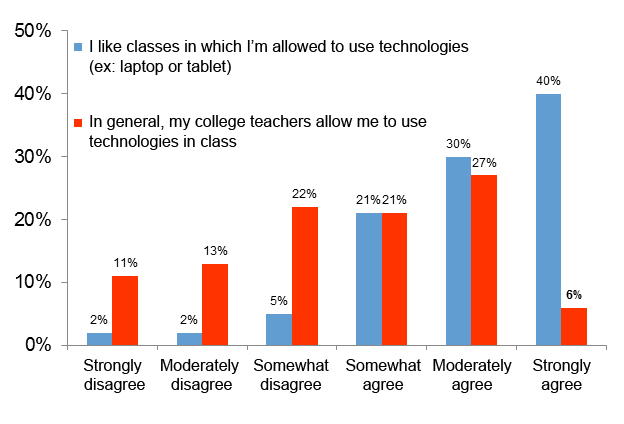Teachers’ Use of ICTs: What Do Students Think?
Special thanks to my co-authors: Alex Lussier, Catherine S. Fichten, Mary Jorgensen, Alice Havel, Jillian Budd, Jennison Asuncion, Mai Nguyen, Rhonda Amsel, Odette Raymond, Tiiu Poldma.
In the context of a research project funded by the FRQSC (Fonds de Recherche du Québec sur la société et la culture), 311 students from Dawson College and Cégep André-Laurendeau were surveyed online, in French or English, about their teachers’ practices in the use of ICTs and cyber-learning. This survey allowed the researchers to collect data on the teachers’ use of technology as well as the students’ level of satisfaction regarding this use.
For the sake of conciseness, please note that all the percentages directly integrated in the text represent the level of satisfaction, that is to say the number of students for whom the use of technology was considered effective.
An Online Survey to Assess Satisfaction
The population that was surveyed for this study included students from several different groups. We were interested in characteristics such as:
- The student’s spoken language(s)
- The college attended by the student
- The student’s gender
- Whether the student had an immigrant status
- Whether the student had any disabilities
Upon our analysis of the different groups, no significant difference between groups has been noticed. As such, the surveyed population is considered to be a homogeneous whole in this study. In the paragraphs below, we shall share a few results that we hope will help improve pedagogical practices at the college level.
Appreciating ICTs: A Student Overview
Before going into the detailed results, here is a particularly significant synthesized result:

Student answers to the statement “I enjoy classes in which teachers use technology”
This graph shows that 94% of students appreciate, at different levels (somewhat, moderately and strongly), the classes in which their teachers use technology. That being said, it is very important to note that some technologies are preferred to others. In general, students appreciate the fact that teachers use an online teaching platform in order to make their teaching materials available to students. Indeed, our research has revealed that the online elements that are most appreciated by students are as follows:
- Their grades (99%)
- The instructions/guidelines for their assignments (97%)
- The course notes (97%)
- The course plan (96%)
The students were also in favor of using an online calendar on which the teachers can write the due dates for assignments as well as the exam dates. They see an advantage in being able to access all the resources mentioned above from anywhere, whether it’d be from the comfort of their home, in their classroom or at Starbucks while sipping on their morning coffee.
Interactivity: mixed results
In addition to the basic functions, the interactive functions of the online teaching platforms were much appreciated by the students:
- 95% of the surveyed students considered that handing in their assignments online is an efficient method
- The platform is also very useful in terms of communication. Indeed, 87% of students appreciate being able to communicate electronically with their teachers.
However, our analysis also leads us to believe that the students prefer that their teachers only use one mean of communication. The results on the use of various media seem to be less unanimous regarding student satisfaction rates:
- Facebook, Twitter and blogs (61%)
- Live chat (59%)
- Forums (53%)
- Instant messaging (45%)
How to Make a Good PowerPoint Presentation
As for slideshow softwares, PowerPoint (98%) is strongly appreciated by students. However, in their comments, they have listed off their expectations quite extensively. In terms of content, their comments were rather specific:
| Do | Don’t |
|---|---|
| Follow this model: 7 words per line, 7 lines per slide | Read off the slides |
| Keep your presentation simple in terms of colors and background | Use too many distracting animations and transitions |
| Use a font sans serif and a reasonable font size | Change slides too fast |
| Only include pictures, tables, graphs and hyperlinks that are pertinent to the class | Rely solely on the PowerPoint slideshow in your lecture |
A Few Suggestions From Students
A recurring suggestion from students is that they wish their teachers allowed them to use their own devices more. However, up to now, few teachers have allowed the use of personal devices in class.

Students and teachers’ perception of the use of personal electronic devices in class.
Another suggestion from students is that some teachers should strive to develop a better knowledge of technology in order to use it with more ease.
Towards the Next Step
In the survey, students were also asked to identify teachers who, in their opinion, were using technologies in a pedagogical context in an exemplary way. These nominations will be used in the second phase of this research as we will interview these teachers in order to share their points of view and expertise with the college network.

